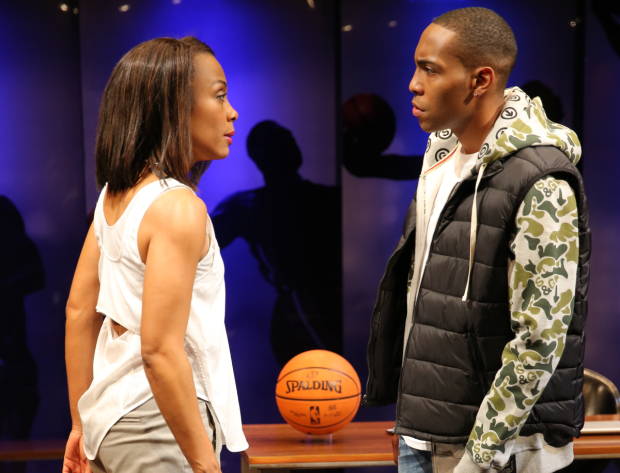King Liz
Karen Pittman presides over Fernanda Coppel’s world premiere at Second Stage Uptown.

(© Carol Rosegg)
"People get out of my way!" bellows Liz Rico as she begins another day of wheeling and dealing with athletic giants. "I feel like making some f*cking money today!"
Karen Pittman, recently seen in the cast of Broadway's Disgraced, stars as the self-crowned title character in Fernanda Coppel's King Liz, making its world premiere at Second Stage Uptown's McGinn/Cazale Theatre. Part Miranda Priestly, part King Lear, Pittman makes the stage her kingdom, embodying her character's status as the most accomplished (i.e. ruthless) sports agent at the Candy Agency and next in line to take the throne as CEO, besting the company's 95 percent male population. She benefits from a good ego-stroking and enjoys power-tripping over colleagues, coaches, and her scurrying assistant (played by the delightfully frenetic Irene Sofia Lucio), who has given Liz five years of loyal, underpaid service. With 22 years of dues paid in full after pulling herself up by her bootstraps, Liz relishes the icy persona and traditionally masculine aggression that gives her the I'm-not-here-to-make-friends edge on her professional competition…No apologies…and don't you dare say the "b" word in her presence.
Of New York's massive influx of new plays each season, strong female leads are few and far between — strong African-American female leads even fewer and farther — so in that regard, King Liz is a welcome addition to the theatrical landscape. Coppel's writing — particularly the self-aggrandizing pitch Liz delivers to the young basketball protégé Freddie Luna (Jeremie Harris) — can be razor-sharp, with juicy zingers sprinkled throughout. But Coppel only partially delivers on her promise to bring a new lens to the play's timely topics of race and gender. Much of the play is a comfortable restating of ideas we've heard before (including platitudes like "You can't allow your past to define you") within a high-powered work environment, directed by Lisa Peterson with an unsettled balance between realism and exaggerated cliché. The sports industry is rarely depicted onstage, but, as our protagonist notes early on with her 95 percent statistic, is a perfect forum for such discussion and begs for greater probing. It's a kingdom ruled by white men, and Liz, against all odds, has clawed her way to the top.
One of these white men is Liz's boss, Mr. Candy, a paradigm perfectly rendered by Michael Cullen, who, in an act of subtle condescension, almost passes as endearing when he regards Liz as one of his "daughters." He goads his star employee to woo the up-and-coming star Luna, who, just out of high school, has stats like LeBron James and promises to be the next big thing in the NBA. A young hothead with a criminal record, Luna is an obvious liability. But winning his business will guarantee Liz's promotion to CEO, so she accepts the challenge and succeeds as deftly as always. Her pitch to him is a no-nonsense appeal to their similarly underprivileged backgrounds — a professional strategy that quickly becomes a personal project. In the boy she sees her young self: an ambitious novice looking for a break in a world that has rarely been forgiving. Sadly, fame and fortune are no antidote for disappointment and betrayal.
As public scandals mount for Freddie (catalyzed by lily-white talk-show host Barbara Flowers, comically portrayed by Caroline Lagerfelt), Coppel offers a uniquely empathetic perspective on the crude headlines that smear the names of our sports gods. Harris, with his simultaneously naive and pompous swagger, lends a deeply personal backstory to these athletic divinities, who quite often are nothing but troubled kids who have been catapulted to stardom and wealth far too quickly.
Liz explains to her new client from the start, "You don't just stand for Freddie Luna. You carry a whole community on your shoulders." Coppel similarly makes Liz a spokesperson for her small community — thoroughly gentrifying her with a head of straightened, shoulder-length hair, form-fitting power suits and dresses (sleekly designed by Jessica Pabst), and a characterless office (designed by Dane Laffrey) with just a row of basketball-playing silhouettes on the back wall. Yet we yearn for more specificity beneath this carefully curated generic persona.
Coppel hints at the affects Liz's professional drive has had on her personal life, briefly mentioning a past romance with Freddie's coach (played by Russell G. Jones as a been-round-the-block expert of his industry's game), but her reluctance to commitment and generally hardened manner remain the products of a few childhood anecdotes and blanket references to a life of hard knocks. As Liz imparts to Freddie, "The world's a sh*tty place. It wasn't built for people like us to be kings." The statement strikes a chord of undeniable truth, but a far richer discord is still waiting to be tapped.










